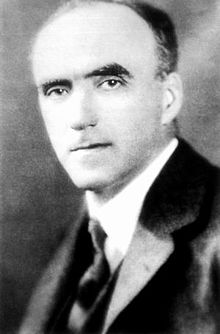 On July 5, 1946, George C. Marshall proposed Dr. John Leighton Stuart to be the United States Ambassador to China. Marshall believed that the great respect that both Communists and Nationalists had for Dr. Stuart would be tremendously helpful during the China Mission’s ongoing negotiations.
On July 5, 1946, George C. Marshall proposed Dr. John Leighton Stuart to be the United States Ambassador to China. Marshall believed that the great respect that both Communists and Nationalists had for Dr. Stuart would be tremendously helpful during the China Mission’s ongoing negotiations.
In a top-secret message to Dean G. Acheson, Marshall stated, “I am requesting War Department to delay Wedemeyer’s departure for China.” Two days (July 2) prior to Marshall’s message to Acheson, Eisenhower had radioed Marshall: “Recent press reports from Shanghai, repeated here, relative to General Wedemeyer’s impending return to China imply your early return to the United States. In the belief that this may be embarrassing to you in your present negotiations I am prepared to relieve Wedemeyer of assignment to China and reassign him to the Continental US, without in any way prejudicing future plans.” Marshall responded to Eisenhower: “Please delay Wedemeyer’s departure from U.S. until I advise later. I am considering drastic alteration of previous plans.”
Marshall found that the recent publicity of Wedemeyer’s impending return disturbed and aroused the Communists greatly, and he requested that Wedemeyer’s nomination as ambassador be indefinitely postponed. Marshall had only one name in mind for the position of ambassador to China; Doctor John Leighton Stuart, the President of Yenching University in Peiping (now Beijing). Stuart was born in Hangzhou, China to American parents who were missionaries. Other than returning to the United States to complete his education, Dr. Stuart had spent his entire life in China as a missionary and educator.
Dr. Stuart had traveled with Marshall to Nanking on two occasions to help advise and influence Generalissimo Chiang Kai-shek and other leaders. Marshall called on Dr. Stuart, because “He occupies a unique position as the most highly respected foreigner, one whose standards of integrity and actions through the 50 years of his life out here have been a model of the best of the western world. Communists and Nationalists alike trust and admire him…He is selfless and has only the interests of China and America at heart.”
Marshall sought to capitalize on Dr. Stuart’s influence with various political leaders, many of whom he knew personally, to keep negotiations moving forward. Marshall also believed that Stuart’s appointment would expand the negotiations from military issues to larger political considerations that would be necessary for the establishment of a more democratic government.
Dr. Stuart was widely acknowledged by several Chinese leaders to be well informed about and to have a sophisticated understanding of China. On July 8, 1946, the Chinese government expressed its approval of Dr. Stuart as ambassador and his appointment was confirmed by the U.S. Senate on July 11.
On July 26th at 5:30 PM Daniel Kurtz-Phelan, author of The China Mission: George C. Marshall’s Unfinished War, 1945-1947, will provide more insights into Marshall’s efforts to peacefully resolve the conflict in China as the opening speaker of the “Friends” in High Places sequence of the Marshall Legacy Series. For more information about the program or to register to attend, please visit the Marshall Foundation website.
